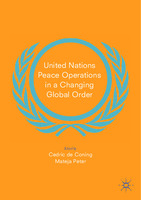United Nations Peace Operations in a Changing Global Order
| dc.contributor.editor | de Coning, Cedric | |
| dc.contributor.editor | Peter, Mateja | |
| dc.date.accessioned | 2020-03-18 13:36:15 | |
| dc.date.accessioned | 2020-04-01T08:56:23Z | |
| dc.date.available | 2020-04-01T08:56:23Z | |
| dc.date.issued | 2019 | |
| dc.identifier | 1007242 | |
| dc.identifier.uri | http://library.oapen.org/handle/20.500.12657/22919 | |
| dc.description.abstract | “I have seen the UN perform on a changing global stage in many UN missions. This book examines how the UN must continue to evolve amongst changing state actors, differing regional organisations and a constant global paradigm shift. It is essential material for enhancing one’s understanding of the nature of international conflict and for the continued relevance of the UN as a key stakeholder and participant in world affairs.” —Maj. Gen. Kristin Lund, Head of Mission and Chief of Staff, UN peacekeeping mission in the Middle East (UNTSO) “This outstanding collection is a must-read for anyone interested in the central challenges of peacekeeping today. From big ideas about changes in global order, to more focused analyses of policing and the protection of civilians, this book provides a comprehensive overview of where peacekeeping is now, and what we may expect in the future.” —Lise Morjé Howard, Associate Professor, Georgetown University “The book analyses recent developments in UN peacekeeping in the context of the historic changes underway in the global order. I would recommend it to policy makers, peacekeepers and scholars who wish to understand, optimise and improve the effectiveness of modern peacekeeping.” —Lt. Gen. Carlos Alberto dos Santos Cruz, former Force Commander in the UN missions in the DRC (MONUSCO) and Haiti (MINUSTAH) “Peacekeeping has been the most visible UN activity in its primary mandate to maintain international peace and security. In a world in disarray, as security threats mutate and the world order shifts away from US primacy and fresh challenges arise, the UN must respond with nimbleness and flexibility to stay relevant. This exceptional collection of analyses by experts from both the global North and South will be of interest to practitioners and scholars alike – highly recommended.” —Ramesh Thakur, Professor, Australian National University “Peacekeeping is not what it was even a decade ago: global power is shifting, new types of conflicts are emerging, and demands on the United Nations and regional organizations are growing. Anyone interested in contemporary conflict resolution and the changing character of international peace operations should read this excellent book.” —Roland Paris, Professor of International Affairs, University of Ottawa “This book is an insightful and forward-looking scholarly contribution to debates within the United Nations. It shows how profound the recent changes affecting peace operations are and pushes us all to rethink our assumptions about conflict, peace and the role of international organizations. It could not come at a better moment.” —Jean-Marie Guehenno, UN High-level Advisory Board on Mediation, former UN Under-Secretary-General for Peacekeeping Operations This open access book explores how UN peace operations are adapting to four transformational trends in the changing global order: (1) the rebalancing of relations between states of the global North and the global South; (2) the rise of regional organisations as providers of peace; (3) the rise of violent extremism and fundamentalist non-state actors; and (4) increasing demands from non-state actors for greater emphasis on human security. It identifies emerging conflict and peace trends (robustness of responses, rise of non-state threats, cross-state conflicts) and puts them in the context of tectonic shifts in the global order (rise of emerging powers, North–South rebalancing, emergence of regional organisations as providers of peace). The volume stimulates a discussion between practitioners and academics from the global North and South, and offers an analysis of how the international community collectively makes sense of the changing global order and its implications for UN peace operations. | |
| dc.language | English | |
| dc.subject.classification | thema EDItEUR::G Reference, Information and Interdisciplinary subjects::GT Interdisciplinary studies::GTU Peace studies and conflict resolution | en_US |
| dc.subject.classification | thema EDItEUR::G Reference, Information and Interdisciplinary subjects::GT Interdisciplinary studies::GTQ Globalization | en_US |
| dc.subject.classification | thema EDItEUR::J Society and Social Sciences::JP Politics and government::JPS International relations | en_US |
| dc.subject.classification | thema EDItEUR::J Society and Social Sciences::JP Politics and government::JPS International relations::JPSN International institutions | en_US |
| dc.subject.other | Political science | |
| dc.subject.other | Peace | |
| dc.subject.other | International organization | |
| dc.subject.other | Security, International | |
| dc.subject.other | Peace | |
| dc.subject.other | Globalization | |
| dc.subject.other | Regionalism | |
| dc.title | United Nations Peace Operations in a Changing Global Order | |
| dc.type | book | |
| oapen.identifier.doi | 10.1007/978-3-319-99106-1 | |
| oapen.relation.isPublishedBy | 6c6992af-b843-4f46-859c-f6e9998e40d5 | |
| oapen.pages | 334 | |
| oapen.place.publication | Cham |

